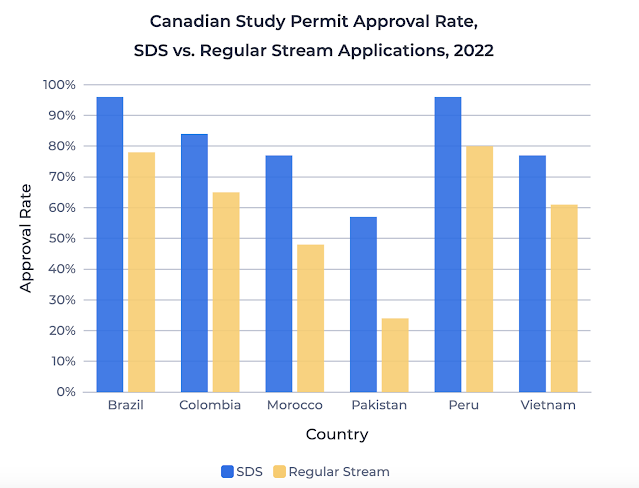

Canada's decision to end SDS will hurt future student visa applicants from more than a dozen countries, including Pakistan - Talent Connected Worldwide
Canada Gets Tough on Foreign Students Amid Mounting Tensions with India
By Riaz Haq
CA

The Canadian government has recently taken a series of steps to cut the number of international students studying in Canada. This is believed to be related to the extremely hostile Indian government response to Canadian allegations that Indian officials ordered the assassination of Sikh activists in Canada.
There are now reports that Ottawa has asked the Indian students to resubmit their documents for review. Earlier, Canada made a decision to end the fast-track visa process, known as Student Direct Stream (SDS), for students coming from India, Pakistan, and a few other developing countries. Meanwhile, US F-1 visas granted to Indian students fell 38% between January and September of 2024.
The United States and Canadian governments are alleging that Indian government agents plotted the assassination of Sikh dissidents on their soil. Their investigations paint a shocking picture of how recklessly Prime Minister Narendra Modi’s government operates.
The criminal charges announced by Washington and Ottawa are backed by Australia, New Zealand and the United Kingdom, the three remaining countries that make up the five-nation intelligence sharing alliance known as the Five Eyes. Revelations made by the US Justice Department and the Royal Canadian Mounted Police (RCMP) indicate that the authorization for Sikh assassinations came directly from top Indian government officials. International criminal gang leader Lawrence Bishnoi is listed among the people tasked with carrying out the murders. These allegations are based on intelligence gathered from multiple communication intercepts among Indian government officials in New Delhi and Indian diplomats posted in Canada.

|
Canadian Student Visa Approval Rates - Source ApplyAbroad |
Canada's Student Direct Stream
As of 2024, there are 427,000 Indian students studying in Canada, surpassing the 337,630 Indian students enrolled in the United States, according to media reports . The SDS was very popular in India, with nearly four in five Indian students applying for their Canadian study permit through the program.
Until recently, foreign students who applied for a Canadian study permit through the SDS saw a significant approval rate advantage over regular-stream applicants in every emerging market. In 2022, India was the biggest beneficiary of SDS with 78% of applicants approved, followed by Pakistan 44%, Vietnam 22%, and China 7%.
Canada's decision to end SDS will hurt future student visa applicants from more than a dozen countries, including Pakistan.
Demand to Resubmit Documents
Indian students in Canada are deeply concerned after receiving notices from Immigration, Refugees, and Citizenship Canada (IRCC) requesting the resubmission of critical documents, including study permits, visas, academic records, attendance, and part-time work details. Many of these students hold visas valid for up to two more years, causing fear.
International Student Visa Cap
The Canadian government has also decided to reduce the number of student visas granted each year. The international student visa cap for 2025 and 2026 is 437,000, which is a 10% reduction from the 2024 target of 485,000. It has also increased the cost-of-living requirement for international students from C$10,000 to C$20,635 a year.
Indian F-1 Student Visas in the US
US F-1 visas granted to Indian students fell 38% between January and September of 2024. According to the US State Department, 64,008 F-1 visas were granted to Indian students, a significant drop from the 1,03,495 issued during the same period in 2023. This number is also reportedly lower than the 93,181 issued in 2022 and marginally higher than the 65,235 recorded in 2021, marking the lowest post-pandemic level, according to Indian media reports .
(Riaz Haq is a Silicon Valley-based Pakistani-American analyst and writer. He blogs at www.riazhaq.com)

